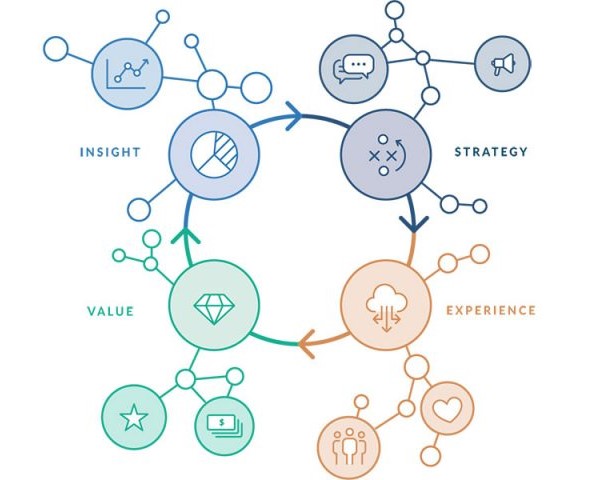By 2019, the global spend on digital transformation technology will surpass $2.1 trillion1 according to the International Data Corporation. Moreover, a PwC survey indicates that 31% of companies2 globally are spending at least 15% of their revenue on digital investments, highlighting the paramount importance of ensuring those investments are beneficial and efficient.
Digital transformation involves a culture where technology and business processes take the lead in providing more value to the customer and employees. It takes advantage of evolving digital capabilities to deviate from a "business as usual" status quo to an innovative company environment. It's not just about gaining an advantage today, it's a strategic investment in your market position tomorrow.
What is the digital transformation cycle?
Expanding on this, the digital transformation cycle is a perpetual process of enhancement, with the wheels of progress greased by optimisation based on accurate insights. Through this process, opportunities to make drastic changes to the business are identified, as are incremental tweaks that will drive gradual yet substantial results. This cycle will require both automated and manual feedback loops to implement these changes across all areas of the business.
Forrester estimates that by 2020, companies utilising an insights-driven approach to fuel constant informed improvements will be generating an additional $1.2 trillion in revenue3. The gains made as a result of this process will see businesses growing at least eight times faster than the global GDP.

A model of digital transformation: The precise practices will vary from one company to the next, but at its core all must involve a loop of analysing activity and using that analysis to extract more value from those activities (Source4).
Making call intelligence a cornerstone in your digital transformation cycle
Not only is call intelligence useful for assisting in all stages of your digital transformation cycle, it is a primary tool for any company that relies on phone calls for sales or customer support. Here are five ways to repeatedly harness your digital transformation with call tracking technologies.
1) PPC mysteries become attributed answers
A business spending on PPC without a resolute understanding of which clicks lead to calls is going to be left taking shots in the dark, wasting money on guesswork. Intelligent call tracking identifies which of those clicks resulted in a new customer picking up the phone, showing you what terms are actually bringing value to your business, not just clicks.
2) Smarter sales processes
Not every caller is equal, some are ready to buy big, some small, some right away, and some just want to enquire. When this diversity is scaled up, matching these calls with the wrong sales and support representatives will cost you money. Call intelligence systems are learning to detect patterns over time to automate an incoming call to the salesperson most likely to close the deal, or the support rep that is most suited to their query.
On top of this, by analysing the actual calls themselves and the data gleaned from them, an intelligent call tracking platform will be a linchpin in the future of effectively training your call staff.
3) Automatic insight generation
The 2017 Global Digital IQ survey noted that when it comes to extracting the wealth of extra profit on offer from technology "enterprises aren’t so much falling behind as struggling to keep up with accelerating standards."5 A key challenge for businesses who are trying to implement digital transformation is collating data, making sense of it, and acting upon it.
Advanced call tracking such as Infinity won't just automatically deliver insights on what marketing channels are providing the greatest ROI, they will provide details on the quality of the calls, and highlight the touch points that are playing a part in the most sales. Working alongside a devoted customer success team, you will be able to swiftly adapt your strategies to react to how they're being received, no matter what size your campaign or business is.
4) Smooth, seamless integration
The last thing you want when building a digital platform stack is to work with a disparate cluster of silos that don't complement each other. The top call tracking products are already integrated with a wide variety of software to ensure your data syncs with what you're seeing on other platforms.
Infinity currently has a range of over 25 third-party integrations, ready to simply plug-in and start working alongside your current digital ecosystem. This includes being the only call tracking provider to become a Google Tag Manager partner.
5) Appetite for disruption
The duality of implementing technology that increases revenue and saves time doesn’t just boost your bottom-line. By empowering swift, decisive actions and automations, your marketing departments will have time freed up to allow deep focus on more innovative campaigns rather than getting stuck in a mire of day-to-day operations. On top of this, as you gather more data on customer journeys and habits, you'll be crowd sourcing feedback to identify the bigger changes needed to truly disrupt how you convert customers within your industry.
Get smarter, spend better, sell more: Kick off your call intelligence improvements today
The digital transformation of your business is not complete without a clear understanding of your customer journey, and the technology to fast-track it to a successful conclusion. Get in touch with us to see how Infinity will benefit you.
References:
1) "IDC Forecasts Worldwide Spending on Digital Transformation Technologies Will Surpass $2 Trillion in 2019", IDC, (January 2016)
2) "What's your digital ROI?", PWC, (2016)
3) "Insights-driven businesses will take $1.2 trillion a year by 2020", Forrester, (Juiy 2016)
4) "The Digital Transformation Cycle", Aesir, (May 2017)
5) "A decade of digital: Keeping pace with transformation", PWC, (2017)